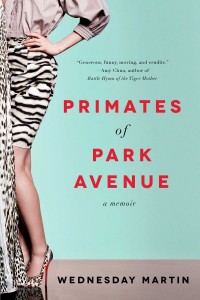June 8, 2015
Does Primates of Park Avenue have “holes big enough to drive an Escalade through”?
by Mark Krotov
 Wednesday Martin’s Primates of Park Avenue, a high-concept memoir that approaches the wealthy wives of Manhattan’s Upper East Side anthropologically—sort of—has been hard to avoid over the last few weeks. Indeed, when I began writing this post a few hours ago, the amount of New York Times pieces about or related to Primates was seven.
Wednesday Martin’s Primates of Park Avenue, a high-concept memoir that approaches the wealthy wives of Manhattan’s Upper East Side anthropologically—sort of—has been hard to avoid over the last few weeks. Indeed, when I began writing this post a few hours ago, the amount of New York Times pieces about or related to Primates was seven.
But on Sunday evening, there appeared an eighth, titled “Publisher to Put Asterisk on ‘Primates of Park Avenue’”:
On Sunday, after a report that there were factual errors in the book, the publisher, Simon & Schuster, said it would append a note to future editions of the book, written by the social researcher Wednesday Martin, clarifying that some of the memoir’s details and chronologies were changed for dramatic effect.
“It is a common narrative technique in memoirs for some names, identifying characteristics and chronologies to be adjusted or disguised, and that is the case with Primates of Park Avenue,” said Cary Goldstein, vice president and executive director of publicity at the publisher.
“A clarifying note will be added to the e-book and to subsequent print editions.”
The report mentioned in the Times was an article in the New York Post, also published on Sunday and modestly titled “Upper East Side housewife’s tell-all book is full of lies.” This article brought the Post’s coverage of Primates of Park Avenue to six pieces and revealed that the book included “holes big enough to drive an Escalade through.”
The Post’s Isabel Vincent and Melissa Klein cite a number of instances of events that could not have occurred when Martin claims they occurred. They claim, for example, that Martin could not have lost her baby weight at a gym called Physique 57 because “the upscale gym did not exist when she claims to have exercised there,” and that guests to a party could not have brought macaroons from Ladurée (they really are very good macaroons) because the bakery didn’t open until 2011, four years after Martin left the Upper East Side.
Martin has also been criticized for her description of the so-called “wife bonus,” a term that first attained public consciousness in her Times op-ed from mid-May (which itself seems to have been adapted from Primates) and quickly spread around the world. (Ginia Bellafante had more on this in her Times piece, and Annie Lowrey also discussed the matter in a New York Magazine interview with Martin.)
If the Post’s catalog of errors is accurate, it’s quite hard to see how the issues in Primates can be substantively addressed by a disclaimer. Given the attention Primates has already received, I have no doubt that we’ll hear much more about this book and its author—particularly because there has been, in addition to the controversies, plenty of engaged and respected coverage of the book.
Sill, these kinds of revelations are never pleasant. On Sunday, the novelist Gabriel Roth offered a cynical but—considering the mind-numbing frequency of such phenomena—justifiably frustrated response to the Post piece:
Can we just assume any nonfiction book that sells well is not entirely truthful? http://t.co/y1m41Azf7j
— Gabriel Roth (@gabrielroth) June 7, 2015
It’d be nice not to have to make this kind of assumption.
Mark Krotov is senior editor at Melville House.